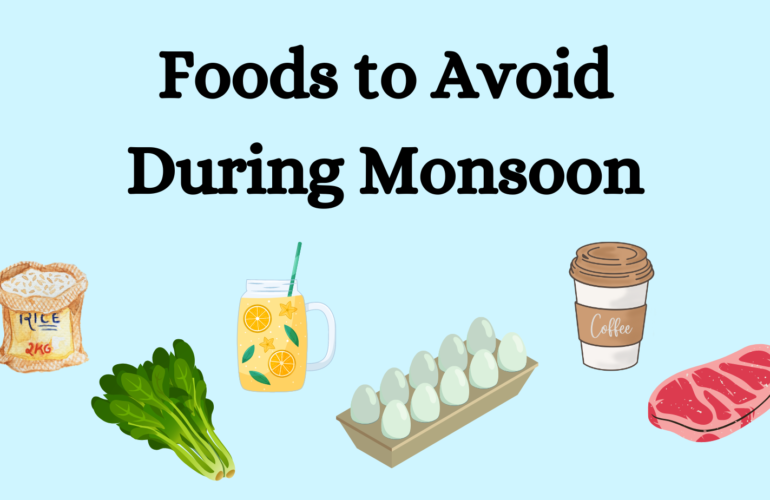The monsoon season brings relief from the scorching heat and rejuvenates the environment with lush greenery. However, it also brings with it an increased risk of foodborne illnesses and health hazards due to the high humidity and water contamination. To stay healthy and enjoy the monsoon to its fullest, it is crucial to be mindful of the foods we consume during this time. Certain food items can pose a higher risk of contamination, spoilage, and digestive problems. By understanding the scientific reasons behind avoiding these foods, we can make informed choices to protect our health and well-being.
In this article, we will explore the scientific reasons for avoiding specific foods during the monsoon season. By being aware of these reasons, we can adjust our dietary habits and make healthier choices. Let’s delve into the list of foods that should be avoided or consumed in moderation to ensure a safe and enjoyable monsoon season.
- Raw food (except fruit) such as vegetables, poultry, etc.: During the monsoon season, there is an increased risk of water and soil contamination, which can lead to the presence of harmful bacteria, parasites, and other pathogens. Raw food items, especially vegetables, and poultry, may harbor these contaminants. Cooking food properly helps kill these pathogens and reduces the risk of foodborne illnesses.
- Leafy vegetables: Leafy vegetables, such as spinach, lettuce, and cabbage, tend to accumulate water and moisture, making them susceptible to fungal and bacterial growth during the monsoon. These damp conditions can promote the growth of pathogens, which may cause food poisoning or gastrointestinal infections. It is advisable to consume thoroughly washed and properly cooked leafy vegetables during this season.
- Cold beverages: Cold beverages, such as chilled water, ice creams, and cold drinks, can lower your body temperature. During the monsoon, the ambient temperature is relatively cooler, and consuming cold beverages may further decrease your body temperature, making you susceptible to colds, coughs, and respiratory infections. It is better to consume beverages at room temperature or warm drinks to maintain a balanced body temperature.
- Junk and street food: Junk and street food often lack proper hygiene and quality control measures. During the monsoon, there is an increased risk of water and food contamination, which can worsen in unhygienic food stalls. Consuming such food can lead to various gastrointestinal infections, food poisoning, and stomach-related issues. It is advisable to opt for home-cooked meals or food from trusted establishments during this season.
- Excess salt and spices: Consuming excess salt and spices during the monsoon can lead to water retention in the body, as they can alter the fluid balance. Excessive salt intake can also put a strain on the kidneys and contribute to high blood pressure. Additionally, spicy foods can cause digestive issues and increase body heat, which may be discomforting during the already humid monsoon season. Moderation is key when it comes to salt and spices in your diet.
- Fermented food: Fermented foods like pickles, idli, and dosa can be a breeding ground for bacteria and fungi, especially in the humid monsoon weather. The moisture content and favorable conditions can facilitate the growth of harmful microorganisms, leading to food spoilage and potential foodborne illnesses. It is advisable to consume fermented foods in moderation and ensure they are prepared and stored hygienically.
- Red meat: Red meat, especially if not stored and cooked properly, can become a source of bacterial contamination during the monsoon. High humidity and temperature can facilitate bacterial growth, leading to foodborne illnesses. It is recommended to consume fresh red meat from trusted sources and ensure proper cooking to eliminate the risk of bacterial contamination.
- Seafood: Seafood, including fish, prawns, and shellfish, can carry various pathogens and toxins. During the monsoon, there is an increased risk of contamination in water bodies, which can affect the quality and safety of seafood. Consumption of contaminated seafood can lead to food poisoning and other gastrointestinal infections. It is advisable to consume seafood from trusted sources and ensure it is cooked thoroughly to kill any potential pathogens.
- Excess oil/fat: Consuming excessive amounts of oil and fat can put a strain on the digestive system, especially during the monsoon when digestion tends to be weaker. Heavy and greasy foods can lead to indigestion, bloating, and discomfort. Additionally, oily and fatty foods are calorie-dense and can contribute to weight gain if consumed in excess. It is recommended to opt for lighter cooking methods and use healthier oils in moderate quantities.
- Limit caffeine: Caffeine acts as a diuretic, which can lead to increased urination and dehydration. During the monsoon season, the humidity levels are already high, and excessive caffeine consumption can further contribute to fluid loss from the body. Dehydration can weaken the immune system and make you more susceptible to infections. It is advisable to limit the intake of caffeinated beverages such as coffee, tea, and energy drinks and opt for hydrating alternatives like herbal teas or infused water.
- Limit rice: Rice is a staple food in many cuisines, but during the monsoon, it is advisable to limit its consumption. Rice can absorb moisture easily, and in humid monsoon weather, it can become a breeding ground for bacteria and fungi, leading to food spoilage and potential health risks. Moreover, rice-based dishes often contain spices, oil, and other ingredients that may not be conducive to digestion during the monsoon season. It is recommended to opt for lighter and easily digestible alternatives such as millet, quinoa, or whole wheat during this time.
